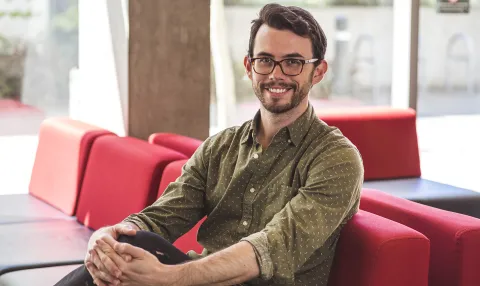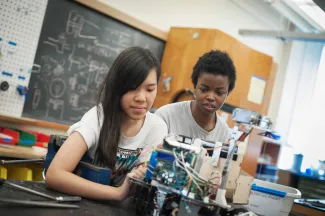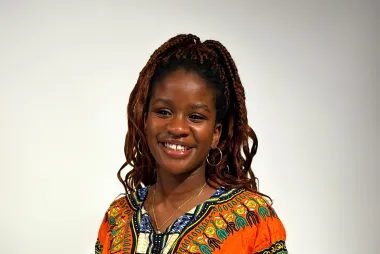“This degree has been a transformative experience in how it’s changed my approach to solving problems and being rigorous and methodical. One of the biggest skills has been developing an eye for the ‘big picture.'”

Andrew Cote
- Degree:
- Bachelor of Applied Science
- Grad year: 2019
- Program:
- Campus: Vancouver
I grew up in Vancouver and as a kid, had a love for all things Lego. So naturally, I studied sociology and planned to become a lawyer. After realizing that law wasn’t right for me, I worked in marketing and sales in the property development industry while planning my next move. Somehow along the way, I gained a weird obsession with physics, and soon realized that it was time to make a big career change if I wanted it to be more than a hobby. I chose UBC Engineering Physics because it would give me the theoretical foundation to work in physics research with the engineering skills to design and build my own tools and experiments. Throughout my degree I’ve been fortunate to work in applied physics research at TRIUMF, General Fusion, Quantum Matter Institute at UBC and most recently, Stanford Linear Accelerator in California. The combination of experimental physics and engineering design has proved to be a very rewarding and challenging field to work in, and I’m looking forward to a career developing new technologies using the skillset I gained at UBC.
Why did you choose engineering?
I can’t help but think of the big picture for us humans. Our day-to-day experiences of the world are hugely influenced by the kinds of technology we use. These all started off as inventions or ideas by engineers and scientists, who have over time solved thousands of problems in dozens of fields to give us the modern age. Long before the word engineer existed, people sought ways to improve their daily lives by observing simple patterns around them, developing a theory to explain that pattern, then leveraging that theory to live a better life. That process is at the heart of the scientific method, and why they call it applied science. Simply put, a natural part of being human is to engineer our surroundings. I’m wonderfully lucky to live in an era where there is so much amazing scientific discovery in progress and the tools we use, like computers, are getting fantastically cheaper everyday. As Isaac Asimov said, “science can amuse and fascinate us all, but it is engineering that changes the world.”
What has made your time at UBC the most memorable?
I’d like to say the late nights and endless assignments stand out, but truthfully they all blur together in hindsight. One surprise looking back was that my intention at UBC was to pick up a technical skill set so I could ‘do physics,’ and along the way I ended up something equally valuable — a tight-knit community of fellow engineering physics students that are ambitious, passionate and immensely talented. I’ve been very fortunate to learn a lot from them and push myself harder and hold a higher standard of work just to keep up. It’s been a pleasure being a part of, and giving back, as much as I can to this community, and I’ve learned that cultivating a supportive, ambitious and driven community of co-workers makes ‘work’ the kind of activity that can be enjoyable and satisfying… in moderation.
What have you learned in engineering that is most valuable?
In my first laboratory job I received a great piece of advice from a recently graduated engineering physics student: master the fundamentals. Mastering the fundamentals teaches you to trust your own answer and approach to problems, and is the first step toward building a coherent, self-consistent understanding of engineering theory and practice. Ideally, when someone asks you if your device will work when you turn it on for the first time, you can say with confidence, “yes.” But also, be prepared for it to not work, because that happens a lot too. Be humble and do more listening than talking where you’re not the expert, which will be almost always. But speak up when the topic is something you’ve mastered; your input and experience are valuable and needed in the big picture.
How do you feel a degree in engineering has benefitted you compared to a different field of study?
I came to engineering with a degree in sociology, but I didn’t think of myself as a sociologist. However, now I do think of myself as an engineer. This degree has been a transformative experience in how it’s changed my approach to solving problems and being rigorous and methodical. One of the biggest skills has been developing an eye for the ‘big picture’ — what is this project for, who does it help and why should we care? — and using that to generate design requirements and inform technical decision-making. As engineers I think we need to be aware of the social impact of our design decisions have and empathize with who will use and be affected by the things we develop. Otherwise you’re just building Death Stars — cool science, but mighty un-neighborly.
What advice would you give a student considering engineering?
When it comes to education, you only get out what you put in, so pick a program that will challenge and push you to improve yourself. Within the Faculty of Applied Science every department is difficult and challenging in its own way, and to stay motivated you have to genuinely appreciate what you’re learning and look forward to the opportunities it opens up in your own future. An engineering education opens a lot of doors and closes very few, so my advice would be to keep experimenting with your interest to see where you’ll thrive.
Where do you find your inspiration?
I’ve been fortunate to sample from a few different areas of engineering research and development in a few different roles — from condensed matter physics, to wireless communications — as everything from a mechanical engineer, to data scientist, to whatever goes between. I’ve discovered my biggest inspiration is in working on giant physics experiments like the ones I saw at General Fusion, TRIUMF and Stanford Linear Accelerator. It’s electrifying; there’s something about standing next to a 100 kilo-volt amplifier that makes your hair stand on end. You realize that these are the cathedrals of the modern era, projects that take national budgets and hundreds of specialized and skilled artisans to make work. The reward is a peek at the mind of God (whoever she is). These projects spawn whole new fields and technologies that enable the next revolution to take place, from quantum computers to medical imaging; these experiments are foundational to levelling up as a species.
What are your plans for the future?
In the last few years I’ve specialized into accelerator physics and engineering, or the art of racing protons in a circle at the speed of light. (It’s like NASCAR but the collisions are harder to see.) I’ll be continuing in that direction with a research project at TRIUMF based on my senior year capstone project, in addition to working as an engineer at the Hatch incubator and taking my own venture through the e@UBC Lean Launchpad program. I was lucky enough to take New Venture Design in my final year which pairs engineers with business students to build a tech-based business venture, and I’d like to keep learning how to commercialize technologies and build successful teams. I love working in applied physics research roles designing and building cool devices, but I’m also excited to learn how to take that technology out of the laboratory and see it put into use in the wider world. A start-up is a great experiment to learn that process first-hand. And as we say in physics research, the experiment is only a failure if you don’t learn anything… or something expensive blows up (that wasn’t supposed to).
How will you go on to make a difference in our world?
One thing I’ve learned while at UBC is that being a part of a healthy and thriving community provides a tremendous sense of purpose and meaning. There are few experiences better than being part of a group of ambitious, motivated and optimistic people dedicated to applying themselves and having fun while doing it. You start asking yourself, not only “who could I become?”, but “who do I need to be?” and “what is the high-value thing I can do that no one else can?”. If you can see the world being a better place because of a course of action you can take, whether it be developing a new technology, starting a company or simply phoning a friend to see how they’re doing, then I think you have a responsibility to do just that. That’s the only way things get better with time.



